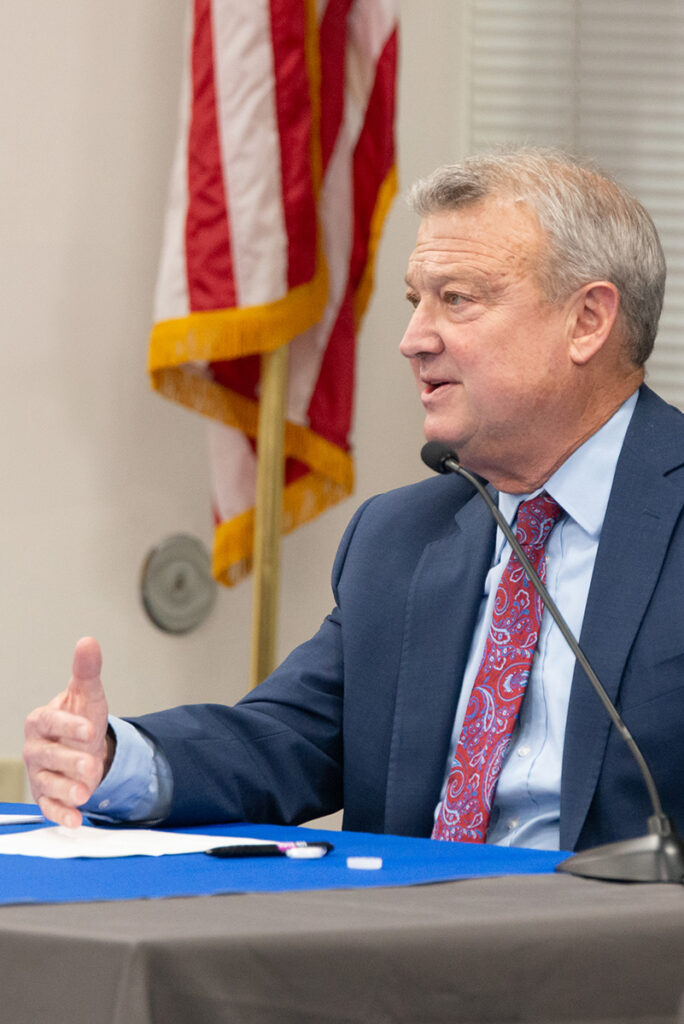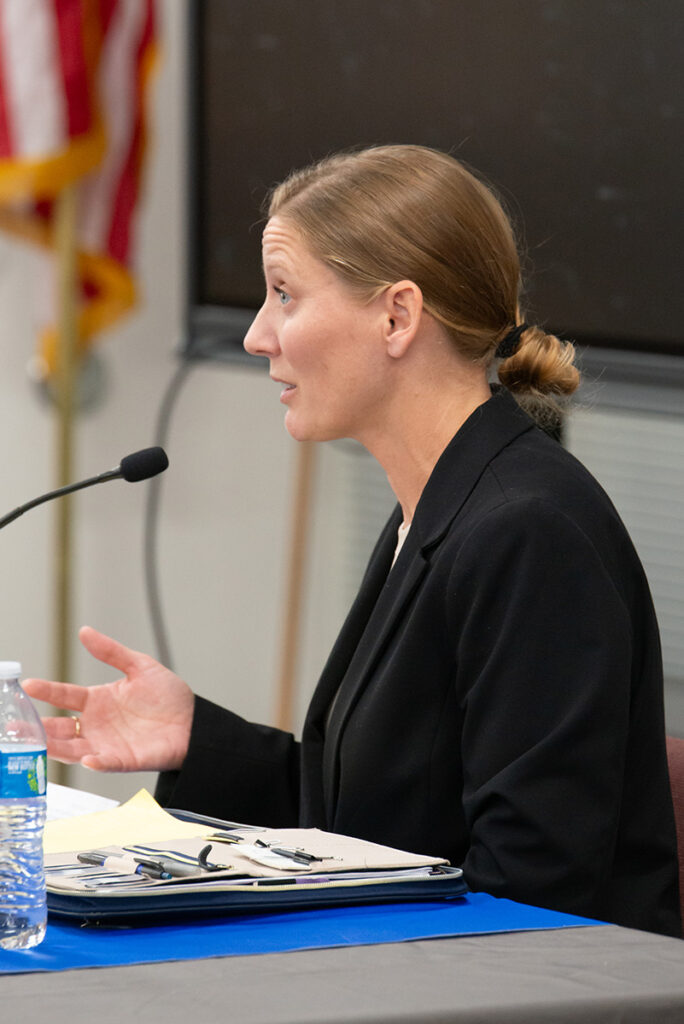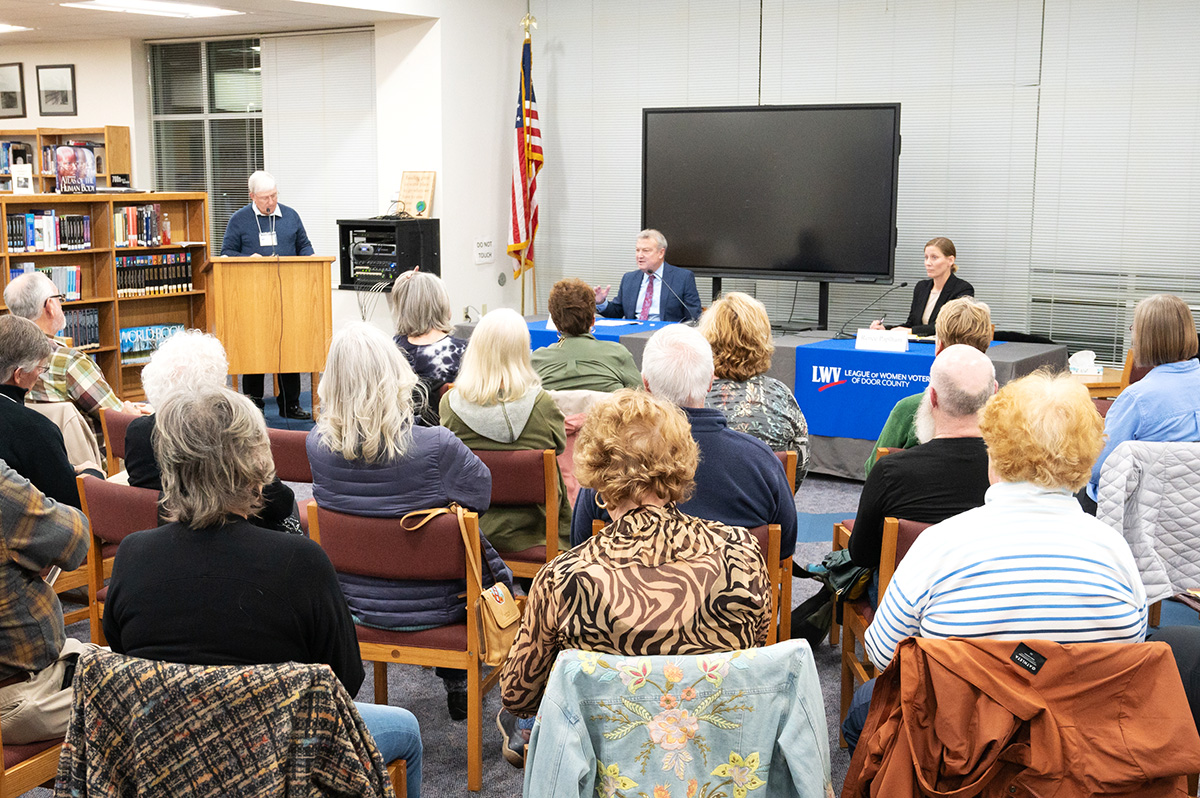On a mild October evening, in the Southern Door High School library, Republican state Rep. Joel Kitchens sat alongside his political opponent, Democrat Renee Paplham. The two candidates answered questions submitted by voters for over an hour.
The candidate forum was sponsored by the Door County chapter of the League of Women Voters, a nonpartisan organization dedicated “to empower citizens to shape better communities worldwide,” according to the mission statement on their website.
The forum was originally scheduled for Oct. 7 but was canceled due to “unforeseen circumstances” and rescheduled for Oct. 23, according to a press release issued by the League. Candidates answered questions submitted by the almost 60 attendees, as well as those submitted in advance of the forum. Both candidates answered every question, as well as getting two minutes each to give opening and closing remarks.
League Chair Ann Morgan reminded the audience the forum was not a debate, and candidates would not address or respond directly to one another. Rather they were to focus on framing their responses in relation to their own views and positions only, she said.
Morgan also reminded attendees to refrain from booing, cheering, laughing or making any audible commentary or reaction to candidates’ responses.


Kitchens, who is running his sixth campaign for the 1st District state assembly seat, was a large-animal veterinarian for most of his professional career and served on the Sturgeon Bay school board for 15 years. In 2014, he turned his attention to the state legislature. Kitchens lives in Sturgeon Bay with his wife, Sherry Billett, who is also a veterinarian. They have three adult children.
Paplham is a newcomer to politics. Born and raised in Kewaunee, she attended UW-Green Bay and received a degree in human development. She lives in Kewaunee with her husband, Brett, and young child.
This story highlights key quotes and positions given by each candidate in response to some of the submitted questions. An audio recording of the entire forum is available online.
Top three issues
The first question candidates were asked was to identify the three issues that topped their priority list, that they would focus on if they were elected.
The economy is the biggest issue, Kitchens said, and reducing taxes and making retirement income tax-free were priorities he said would improve Wisconsin’s economy. Education is also a priority, according to Kitchens.
“I think we need to more fully implement the science of reading and reading initiative that I started in the last session,” he said.
Kitchens was referring to a GOP-led reading education reform law that focuses on reading curriculums that use science-based practices like phonics to teach reading in Wisconsin public schools. He was the chair of the Assembly education committee and intends to continue that role should he be re-elected, he said.
Paplham said taking care of the immediate needs of Wisconsinites who are struggling is her top priority. She identified three areas where those needs are: child care, the housing supply and affordable home prices, and affordable quality health care.
“We need to tackle the child care crisis that we’re facing because without it we are set to lose 2,000 additional providers and leave 87,000 children without a care provider. We are already on a cliff where 54 percent of Wisconsinites are living in a child care desert,” Paplham said. “This is directly linked to the economic vitality of our state.”
(According to fact-checking research by Knock, Paplham is using data from reports by the Century Foundation and the Center for American Progress. )
Money
Wisconsin has a $4.6 billion budget surplus as a result of several factors, including increased revenue and federal aid, according to a Wisconsin Policy Forum analysis. Candidates were asked what they would do with that surplus and what initiatives deserve additional funding.
Kitchens called the state surplus “pandemic spending money” and said the state must be judicious in how it uses it. He warned against spending on programs that have an ongoing cost, in order not to create a “structural deficit in the budget.”
Paplham agreed it was important to be fiscally responsible and put the money to good work, but she said the state’s citizens should not have to “beg legislature to invest in their problems.”
“I would prop up the childcare industry to boost our economy on the back end. Do the same with housing,” Paplham said. “When markets can’t do it themselves, we have to spend thoughtfully and invest in our working class.”
Candidates were also asked whether they were in favor of expanding Medicaid. Wisconsin is one of ten states that has not done so under the Affordable Care Act. States can expand the coverage to adults with incomes up to 138 percent of the federal poverty level. Right now, Medicaid covers adults in Wisconsin up to 100 percent of that level.
Kitchens said he did not support the expansion of Medicaid coverage. It is not “free money,” he said, and it would create an increase in insurance premiums.
“Our insurance premiums will go up because Medicaid only reimburses two thirds of what it costs to buy the healthcare. Just the costs, not the charge.” Kitchens said. “Every patient the doctor sees, they are losing money.”
He went on to reference a report published by the Crowe Center for Research on the Wisconsin Economy at UW-Madison, and co-produced by WILL, a conservative legal organization, that estimates it would cost $600 million in increased insurance premiums across the state if legislators accept Medicaid expansion.
Paplham said she is in favor of Medicaid expansion, and by not doing so, Wisconsin is “not reflecting the voice of the people,” she said, “We have a moral obligation to take care of our citizens in the wealthiest country in the world.”
Abortion
Candidates were asked if they support a women’s right to choose and how they would vote on the issue of abortion in the state assembly.
Some background on Wisconsin abortion law:
After the 2022 Supreme Court decision to overturn Roe v. Wade and nullify the federal right to an abortion, Wisconsin returned to an 1849 law banning all abortions unless the mother’s life was in danger. For 15 months, abortion was effectively illegal in the state.
In September 2023, a Dane County judge ruled that the 1849 law was intended to criminalize intentional feticide, not consensual medical abortion. Planned Parenthood in Milwaukee began offering abortion services the next day. The ruling returned Wisconsin abortion law to where it was prior to the Dobbs decision. Abortion is currently legal at up to 20 weeks of pregnancy in the state.
The Dane County ruling is currently being challenged by anti-abortion proponents.
In the meantime, Republican legislators introduced a bill in January 2024 that sought to add a referendum to last April’s ballot. The referendum would have asked voters to approve a law that would make abortion illegal after 14 weeks. The bill must pass the state house of representatives and the senate in order to become a ballot referendum.
The bill passed the state assembly but did not go before the senate in the most recent session, and therefore was not on the ballot.
“Abortion is a moral issue. We all have our own ideas of when human life begins,” Kitchens said. He indicated he supported having a referendum on the ballot about the issue and said “I think we let the public decide on this.”
“With all the issues we’re facing, I don’t believe this is the issue we should choose our leaders based on,” Kitchens added.
Paplham said the Dobbs decision was why she got involved in politics in the first place and it is extremely wrong to take away a woman’s right to choose. The decision should be up to a woman, her doctor and her loved ones, she said.
“After Roe fell, we had a gerrymandered Republican legislature that tried to tell us what was best for women.” she said. “A woman’s ability to choose if, when and how to start a family ensures that she has full and equal participation in society.”
Elections and government
Candidates were asked to define small government versus large government and how they differ when implemented.
The Republican party is the party of personal responsibility, and the government cannot support everyone, Kitchens said. Small government means the government does not solve all people’s problems.
“If someone falls down, I’ll help them up, but not carry them,” he said.
Paplham said she thinks of local government as small government, with local control over issues they know best. However, when there are big problems a local government cannot tackle on their own, like child care and PFAS contamination, “we call in the big guys,” she said, referring to the state or federal government.
Candidates were also asked their positions on an election law issue, the “State of Wisconsin Eligibility to Vote Referendum” on the November ballot. Kitchens and Paplham had opposing viewpoints.
The state constitutional amendment seeks to change the language regarding noncitizen voting rights and it reads: “Eligibility to vote. Shall section 1 of article III of the constitution, which deals with suffrage, be amended to provide that only a United States citizen age 18 or older who resides in an election district may vote in an election for national, state, or local office or at a statewide or local referendum?”
“It’s not about non-citizens cheating in our elections,” Kitchens said. States like California, New York, Maryland and Vermont have municipalities that allow non-citizens who are legal permanent residents or green-card holders to vote in some local elections, he said, and the amendment seeks to make sure that does not ever happen in Wisconsin.
“It’s only being challenged by Democrats because Republicans put it on the ballot,” he said.
The amendment is unnecessary, according to Paplham, “This is something we already have a rule and law for.”
She called the measure “highly inflammatory” and the legislature should be focusing on other issues.
“Non-citizen voting is a nonissue,” Paplham said. “I’m sad it is on the ballot.”
Environment
Candidates were asked what they thought the highest priority environmental issues for their district were, and clean water was the shared answer.
Kitchens stated how he had already done a lot of work to enhance groundwater contamination oversight, by imposing regulation that allowed manure spreading according to soil depth. Farmers and stakeholders got involved and came up with solutions, he said.
There is more work to do, he added, but “we’ve come a long way” and he would continue to work to incentivize and support farmers in using new technology, sustainable farming practices and coming up with solutions to groundwater and surface water contamination.
Paplham said clean water is an issue Republicans and Democrats need to “work across the aisle on” with businesses and farmers, using state and federal resources to promote sustainable farming practices.
Candidates also both agreed they would support the Knowles-Nelson Stewardship program, which is up for renewal in 2025, though Kitchens did say the funding should have “guardrails” built into it.
The fund was created by the state in 1989 and is run by the Wisconsin Department of Natural Resources. Grants from the fund allow conservation groups, municipal governments and the DNR to perform a number of conservation projects across the state, including purchasing land. Door County Land Trust, the Nature Conservancy, and just about every municipality in Door County has benefitted from these funds.
The DNR is asking the state for a renewal of funding in the amount of $100 million every year for the next 10 years.
Child care
The state program Childcare Counts, which provides supportive funding to childcare centers in Wisconsin, is due to expire in 2025. Candidates were asked what legislation regarding child care they would support going forward.
While acknowledging the economic model of the industry is challenging, Kitchens said, Childcare Counts was a pandemic program to keep child care centers in business. Carrying it on forever is not something he agrees with.
“Throwing a bunch of money at child care centers is not the way to do it,” he said.
Kitchens said instead the state should give assistance to people who cannot afford child care, and encourage more in-home child care opportunities, rather than make it “an entitlement that they’ll (the child care industry) rely on forever.”
Child care is at a tipping point and this will affect the economy in very negative ways, according to Paplham.
“Sometimes you have to throw money at problems until they get better,” she said, “and calling this entitlement, as if we don’t deserve it, or it somehow is our fault, really grinds my gears. So yeah, we’re gonna throw some money at it. That doesn’t mean we’ll do it forever.”
Transgender rights
Candidates were asked if they support or oppose legislation that would prohibit trans female athletes to compete in girls’ and women’s sports?
Kitchens said he supported individual freedom when it comes to gender and sexual identity as long as it does not adversely affect others.
“We have a growing situation, it’s happening more and more, that biological males are playing female sports…it’s a growing problem,” he said. “It’s scientific fact males are bigger, stronger, faster on average. We have to acknowledge that.”
Kitchens said it is a threat to girls’ sports if trans females are allowed to compete.
“I want basic human rights for everyone and all that, but it’s not fair to female athletes,” he concluded.
“I do not support legislation targeting, what, five children in the state?” Paplham said. “The party that calls themself the small government party wants to strongarm this topic.”
She said it was best left to organizations like the Wisconsin Interscholastic Activities Association and schools to deal with this issue.
“Targeting these children is theater and further harms the trans children who are more than likely struggling with their adolescence already,” she added.

